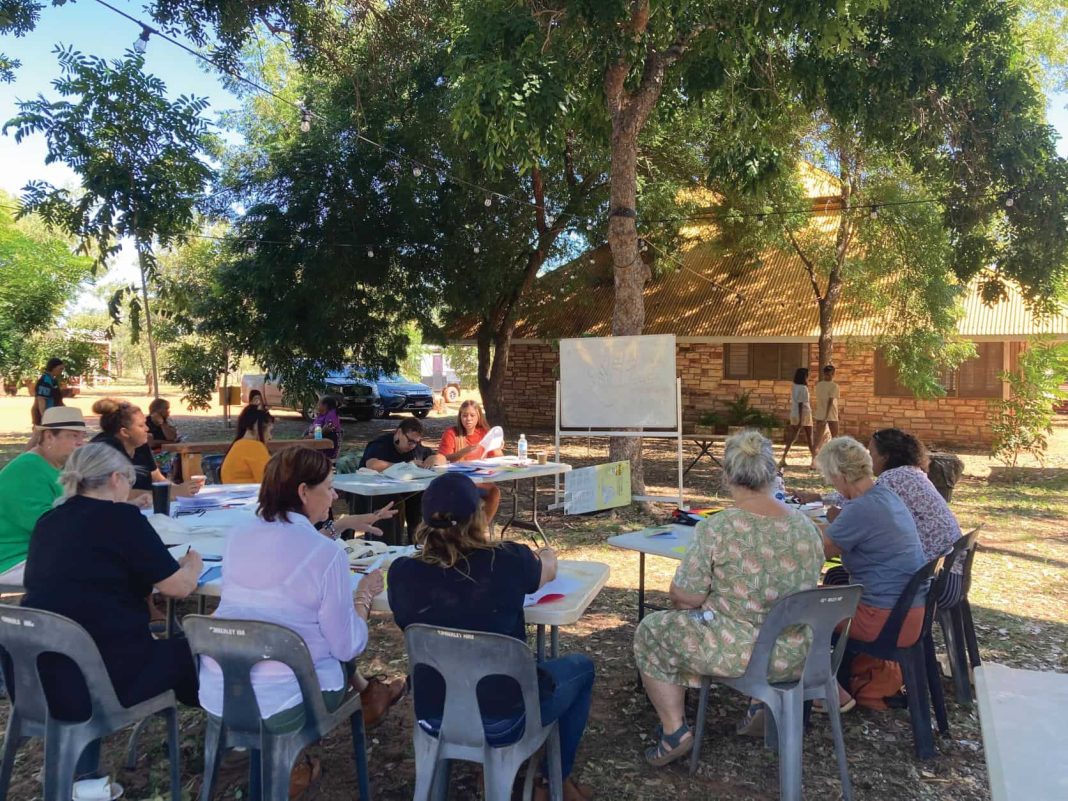Coming to Canberra next week, the team from Our Yarning Aboriginal library collection travel across Australia holding workshops to help First Nations People tell their stories.
The books written in the workshop are added to their digital library, which is available via the free app, in hopes of sparking a love of reading in Indigenous youth. The initiative comes to the University of Canberra on 21-22 September, where they will be hosting two writing workshops and speaking to an Aussie adventurer.
Huw Kingston has been raising funds for the digital library during his Alpine Odessey, which sees him ski across the full length of Australia’s snow country. He anticipates it will take 50 days and hopefully help reach his goal of $50,000. Fresh from the slopes, the Save the Children ambassador joins Dr Julie Owen to discuss his adventures and the importance of Our Yarning.
Dr Owen has a doctorate in Aboriginal health and is dedicated to increasing access to education for First Nations People. In her role as Cultural Advisor to the Library For All organisation, Dr Owen has spearheaded the Our Yarning Collection, and moves around the country encouraging Indigenous Australians to create books that speak to their youth.
“Growing up I never had books about Aboriginal people. Even my children, they had no mirror books, it was a battle to find books they were interested in,” she says.
They began working on Our Yarning in March 2021 with a goal of 500 stories in the first five years. So far, they have successfully helped 160 stories to be written, with between 60-110 already available to read on the app and others in the pipeline. The authors are encouraged to share a story that has been passed down, either from their imagination or something that happened to them as a child. Their experiences will be what speaks to children like them.
“They think ‘that is my family, mob, country’. They then feel encouraged and motivated to learn to read and assist with their literacy skills.”
The stories are what Dr Owen refers to as mirror books, in which Indigenous children can see themselves as the hero of the story. While most books available to children show kids in suburban life, that’s something a child in a regional or rural area won’t be able to relate to, she says.
“We want kids to not only see their own culture but to see Aboriginal kids in a positive way and Aboriginal culture in a colourful, fun, exciting way.”
The discrepancy in literacy levels between Indigenous and non-Indigenous youth isn’t one that is exclusive to Australia. Dr Owen says it happens in all countries where a nonnative culture plays an overpowering role.
“It’s a global thing; the Indigenous populations around the world are lower [in literacy] because they will have been oral storytellers. The resources of the dominant culture with non-Indigenous people is shown in books.”
None of the books are told completely in language as they want to focus on English literacy attainment, to ensure Indigenous children will not be disadvantaged as they enter schooling. However, authors are encouraged to include in language words for things like animals, as they know how important it is to keep a connection to language and culture.
“We stay away from complete language groups because there are organisations that have linguists and focus on translation.”
Dr Owen says there is a dilemma about the amount of screentime young minds should be consuming. However, by having a digital library you don’t have to worry about any books getting lost or damaged and they are learning during their screentime.
“If they are reading and their literacy level is getting raised, by the time they get to school they will be competent with readers,” she says.
The written words tell the story of Indigenous experiences, and the illustrators are open to people from all backgrounds. Dr Owen says they have so many works under way they are calling for more illustrators to come forward to be a part of the project.
While the app is only available on android via google play, upgrades are underway to see it added to the Apple store, hopefully later this year.
While in Canberra, they plan to visit playgroups and share some of the stories from Our Yarning. The long-term goal is to have the stories accessible any way you can find books.
“I want them in every school, in immigration centres, I want them across the country because they are stories about Australia, they are stories about Aboriginal kids in Australia,” Dr Owen says.
To find out more about Library For All and Our Yarning, head to libraryforall.org
Get local, national and world news, plus sport, entertainment, lifestyle, competitions and more delivered straight to your inbox with the Canberra Daily Daily Newsletter. Sign up here.



